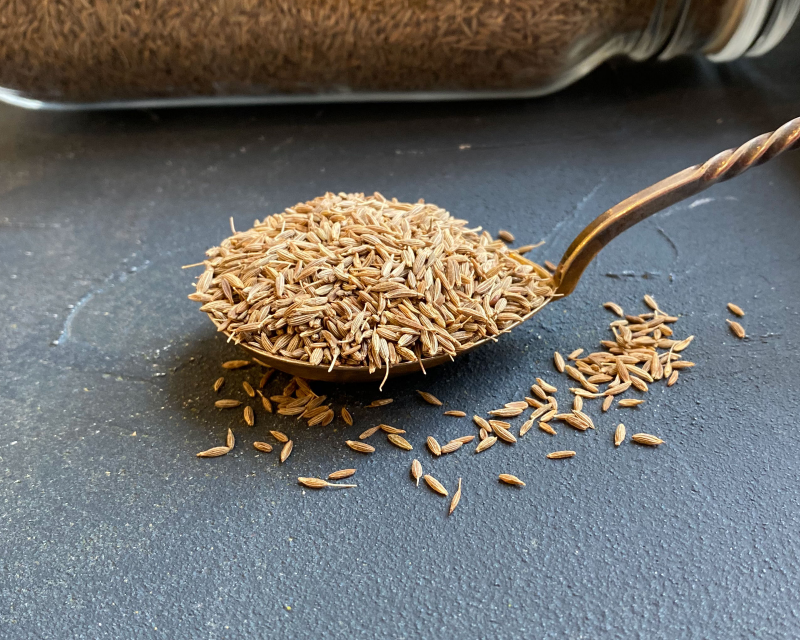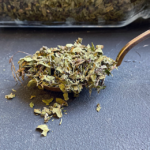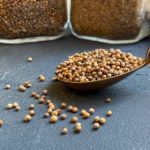Organic cumin seeds
From 3.05€
From spicy Latin dishes to savoury Indian and Middle Eastern cuisine, cumin knows no borders. Although it is a small, simple seed, it has a special flavour that complements a variety of dishes. From curries to cheeses and sauces, cumin is a staple in many international favourites and is widely loved all over the world.
In the Middle East, North Africa and India, it is an essential spice in national dishes such as couscous, baharat, chutney and curries.
Cumin seeds are small dried fruits derived from a small Umbelliferae plant belonging to the same plant family as parsley, carrots, dill and cumin. The plant is native to the Mediterranean region and Egypt, and is cultivated in the western Mediterranean via the Middle East and India.
Since cumin is adapted to both warm and cool climates, they are easily cultivated worldwide. By the way, India is the largest producer and consumer of this popular spice.
Cumin seeds (Cuminum cyminum) are one of the best spices for supporting healthy digestion. In India, its Sanskrit name literally means “stimulates digestion”. In addition to adding flavour to food, cumin also stimulates the digestive fire, promoting healthy absorption and removing toxins from the digestive tract. The seeds are also often chewed after meals to improve digestion and remove food odours.
The seeds of cumin are pale, yellowish-green and oblong in shape. They have nine raised ridges. The seeds are similar to cumin seeds. Not surprisingly, cumin seeds are often confused with cumin seeds because of their strong similarity and similar aroma. The most noticeable difference between the two is that cumin seeds are lighter in colour and covered with very fine, barely visible bristles.
Cumin are often described as having a strong flavour, warm and earthy, with a spicy, bittersweet aroma and light citrus undertones. Cumin is usually compared to caraway seeds as a slightly spicier alternative.
Although the colour and flavour varies from region to region, the flavour of cumin is less influenced by the origin and more by the oil content. The higher the oil content, the more flavourful the cumin.
The essential oil content of cumin seeds ranges from 2 to 5%, we obtain the highest quality seeds with a content ranging from 3 to 5% to ensure an intense flavour. It is important to note that cumin seeds must be kept tightly sealed and protected from moisture.
Tea recipe:
Take 0.5 teaspoon each of cumin seeds, coriander seeds and fennel seeds.
You can lightly crush the seeds and soak them in 1 litre of warm water for at least one hour.
Then bring the water to the boil with the three ingredients and simmer on low heat for about 10 minutes. Do not forget to cover the pot.
This tea can be drunk 1-2 cups every day.
It is a popular natural mixture that can help with digestion. It can stimulate the release of digestive enzymes and help reduce bloating and gas.
The tea has a cleansing effect on the body.
All three ingredients in this tea are fat burners, so this tea can help reduce the accumulation of fat in the body.
The tea calms the mind and relaxes the nervous system. This effect is due to the coriander and fennel seeds in this tea.
Cumin and fennel seeds are well-known galactagogues. Tea containing these ingredients is suitable for breastfeeding mothers.
Caraway seeds in tea help to improve the absorption of essential nutrients in the body.
Tea can help relieve abdominal cramps during menstruation. However, cumin also stimulates menstruation and should not be used in cases of heavy bleeding.
Note
You should avoid it during pregnancy as fennel seeds may be associated with stimulation of uterine contractions.
NOTE. The information contained herein should not be construed as a recommendation for treatment or other health issues. We encourage you to make personal decisions about your personal health, taking into account a wide range of sources of information.
Organic cumin seeds (Cuminum cyminum) 100%
-
Store in a dry, cool place, tightly closed to protect against moisture.




